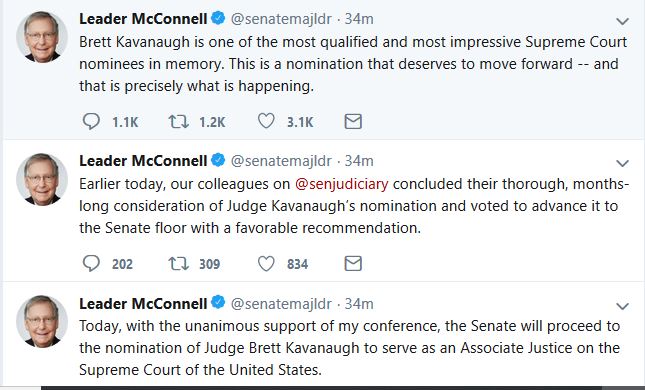“THE SENATE WILL PROCEED”
by Sharon Rondeau
 (Sep. 28, 2018) — On Friday evening, Senate Majority Leader Mitch McConnell tweeted that all 51 Republicans voted to advance the nomination of Judge Brett M. Kavanaugh to the U.S. Supreme Court.
(Sep. 28, 2018) — On Friday evening, Senate Majority Leader Mitch McConnell tweeted that all 51 Republicans voted to advance the nomination of Judge Brett M. Kavanaugh to the U.S. Supreme Court.
The Twitter announcement follows Kavanaugh’s approval by the Senate Judiciary Committee on Friday afternoon by an 11-10 party-line vote.
Kavanaugh’s confirmation process has been the most contentious in modern history for a number of reasons not stemming from a lack of judicial or legal qualifications in the strict sense.
Kavanaugh has served for 12 years on the U.S. District Court of Appeals for the DC Circuit, considered to be the second-highest court in the country. Prior to that service, Kavanaugh taught law at Harvard Law School and clerked for the now-retired Associate Justice Anthony Kennedy, who he will replace if confirmed.
From the outset, Democrats opposed Kavanaugh’s July 9 nomination by President Donald Trump, with many refusing to hold courtesy calls with him in the ensuing weeks, as is customary.
His confirmation hearings on September 4, 5 and 6 were marred by Democrats interrupting committee Chairman Charles Grassley and each other to object to the proceedings. Protesters also caused frequent disruptions.
At the time, Democrats claimed that most of Kavanaugh’s documentation had not been released and threatened to sue the National Archives for it. The documents they said they sought were generated when Kavanaugh served as staff secretary to then-President George W. Bush between 2001 and 2006.
Democrats have also referred to “what’s at stake” if Kavanaugh were to be eventually confirmed, with the issue being that of the 1973 case of Roe v. Wade. Many American women, in particular, feel strongly in favor of or against abortion, which the case rendered “legal” throughout the U.S. through a certain point in the woman’s pregnancy unless her life were endangered later on.
Over the last few years, a number of states in the Midwest and South have passed statutes restricting access to the procedure.
Kavanaugh affirmed Roe as “settled law” during the hearings, but some believe that as a Catholic and a “conservative,” he will be the determining vote in overturning the opinion.
No court can initiate a review of a case on its own, a fact often disregarded by the voting public.
McConnell originally planned to begin debate Kavanaugh’s nomination on the Senate floor Saturday with a possible vote on Tuesday. With the new development, those dates are certain to shift. Nevertheless, McConnell tweeted that “the Senate will proceed to the nomination of Judge Brett Kavanaugh to serve as an Associate Justice on the Supreme Court of the United States.”

Kavanaugh’s confirmation responses were considered by his supporters to be well-thought-out and demonstrative of a brilliant legal mind. Democrats remain unconvinced that he should advance to the high court.
One Democrat who did meet with Kavanaugh during the courtesy-call period was Judiciary Committee ranking member Dianne Feinstein (CA), on August 20. She said nothing about a letter she had acquired from a constituent approximately three weeks earlier claiming that Kavanaugh had sexually assaulted her during the early 1980s at an unspecified place and time.
The author of the letter, Dr. Christine Blasey Ford, had requested anonymity, although the media discovered her identity. Feinstein has since said that her office did not leak the letter to the press and provided it only to the FBI for further investigation on September 12.
At the time, the FBI said it could not investigate Ford’s claims and that it considered its latest background check of Kavanaugh to be completed.
Democrats insisted that Ford should be given a hearing, and Republicans agreed. In what became a tumultuous two-week period, Ford’s attorneys arranged for her to provide public testimony on September 27 to air her allegations, after which Kavanaugh would be given a chance to respond.
In documentation provided to the Judiciary Committee prior to her testimony, four individuals Ford identified as having attended the gathering said they had no recollection of it. One, Ford’s “longtime friend,” said she does not know Kavanaugh and was never at a gathering where he or Dr. Ford were present.
Many found Ford and Kavanaugh credible, although Ford provided no corroboration of her story and admitted that she cannot recall certain details of the alleged assault. Kavanaugh has denied the claims categorically from the time he learned of them.
Democrats on the committee favored Ford’s account over Kavanaugh’s and balked at the prospect of voting on his nomination Friday. The final result was that the committee approved Kavanaugh’s nomination early Friday afternoon with one caveat: that the FBI conduct a brief additional probe of Ford’s allegations.
Just before 5:00 PM on Friday, President Trump ordered the FBI to complete a “supplemental” investigation to be done in “less than one week.” Kavanaugh and two of the individuals Ford named stated that they will cooperate with the investigation.
Kavanaugh has to date undergone six FBI background checks which uncovered no concerns.
Ford’s attorneys reacted to the news by stating that there should be no time or scope constraints on the FBI’s probe of Ford’s allegations.
A number of Judiciary Committee Republicans stated during Thursday’s testimony that they favored Kavanaugh’s nomination based on the presumption of innocence in the face of no corroborating evidence. Not a member of the committee, McConnell issued a written statement repeating that premise.


I think Murkowski and Collins should be investigated. Whenever a big vote comes up, they side with the democrats. I want to know their activities. They are not Republicans, that’s for sure.